高考英语口语交际用语集锦
高考英语交际用语分类总结
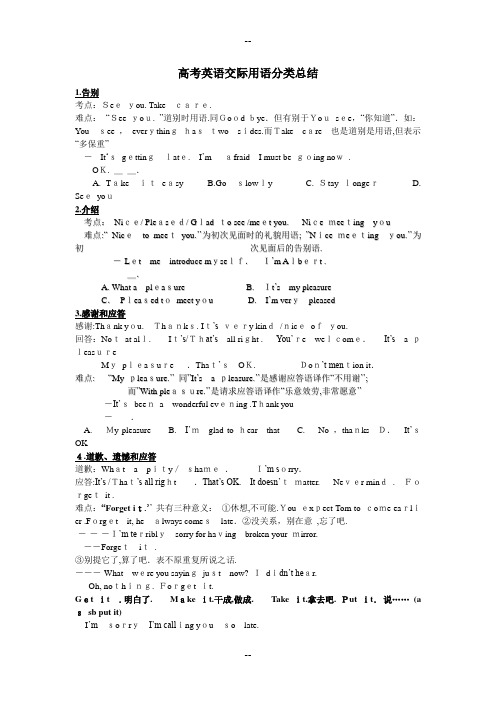
高考英语交际用语分类总结1.告别考点:Seeyou. Takecare.难点:“See you. ”道别时用语.同Good-bye.但有别于Yousee,“你知道”.如:Yousee ,everythinghastwo sides.而Take care也是道别是用语,但表示“多保重”--- It‘sgettinglate.I’mafraid I must be going now.---OK.____.A. TakeiteasyB.GoslowlyC. Stay longerD. Seeyou2.介绍考点:N ice/P l eased/Gla dto s e e/m eet y o u.N iceme eti n g you难点:“N i cet o m e ety o u.’’为初次见面时的礼貌用语;”Nic emeeti n gyo u.’’为初次见面后的告别语.---Let m e i n t r o d u c e mys elf.I’m Albert.---___.A.W h a t a p leasu r eB.It’s m y p l e a s u r eC.Ple ase d tom e e t you D.I’m v e ryp l e a s e d3.感谢和应答感谢:Thank you. Thanks. It’s very kind/niceofyou.回答:Notat all. It’s/That’s all right .You’re welcome.It’s a pleasureMypleasure.That’sOK. Don’t mention it.难点:“M ypl e asu r e.’’同”I t’s apl e a s u r e.’’是感谢应答语译作“不用谢’’;而”W i t h p l easur e.’’是请求应答语译作“乐意效劳,非常愿意’’--It’sbeena wonderful evening .Thank you--____.A. My pleasureB.I’mglad to hear thatC. No ,thanks D.I t’sOK4.道歉、遗憾和应答道歉:What a pity/shame.I’m sorry.应答:It’s /That’s all right.That’s OK.It doesn’tmatter. Never mind.Forgetit .难点:“Forget it.’’ 共有三种意义:①休想,不可能.You expect Tom to come earlier .Forget it, healways comeslate.②没关系,别在意,忘了吧.------I’m terriblysorry for having broken your mirror.-----Forgetit.③别提它了,算了吧.表不原重复所说之话.----What were you sayingjust now? Ididn’t hear.---- Oh, nothing. Forget it.Get it.明白了. Make it.干成,做成. Take it.拿去吧. Put it.说……(a ssb put it)--I’msorryI’m calling youso late.--___Okay.A.Thisis B.You’re C.That’s D.I’m5.请求、允许和应答请求:May /Can /CouldI…?Would/Do Youmind…?应答肯定):Yes/Sure/Certainly. Yes,please.Of course(not) ,you may/can. Take yourt ime.Yes ,help yourself .Go ahead,please .Not at all.That’s OK /allright .Not intheleast .Not a bit.(否定):I’d rather you didn’t.You’d bett er not. I’m sorryyou can’t.难点:“Take it easy.’’安慰对方不要生气、紧张不安,即to tell someoneto becomeless upset or angry; ”Takeyourtime.’’同no hurry.安慰对方不要急,慢慢来,“Sure, goahead.’’当然可以,干吧、做吧、说吧等; ”helpyourself.’’同意对方使用,让对方自己动手取; Not in the least.一点也不--Can I look at the menu fora few more minutes beforeIdecide?--Of course . ______,sir.A.Makeyourself at home B . Enjoy yourselfC.It doesn’t matter D. Take your time6.祝愿、祝贺和应答祝愿:Goodluck! Enjoy yourself! Have fun! Congratulations.应答:Thank y ou. The sameto you .You, too.难点: Well done!干得好,真棒!用以赞扬对方做得好.Congratulations!祝贺对方已取得成功.“Good luck !‘’ 祝愿对方交好运,反语为:Badluck!或Just myluck!”真倒霉,真不走运,我的运气总是这样差.Havefun!’’祝愿对方玩得开心,同Enjoy yourself.7.打电话考点:Is that…speaking?Holdon, please. Just a minute,please. He llo,who is it /that 〈speaking〉?Hello,this is …speaking.There’s no Pippa here. Speaking.难点:熟练掌握打电话用语.指对方时用指示代词that/it.指说话者本人时用指示代词this.打电话用语还有:Are you there?你还在接听吗?Suppose you ring me up.你给我打电话好吗?等等.--Goodmorning,Grand Hotel.– Hello, I’dlike to bookaroom for the nights of the 18thand19th.--_____.A. WhatcanI dofor you ?B. Justa minute,pleaseC. What’s the matter?D. At yourservice8.就餐考点Helpyourself to some… ;I’m full,thankyou.;Justa little,pl ease .Yes, I’d like a drink .Yes ,sir ?难点:“Yes,sir?’’ 是应答语,用于应答呼唤或表示在关注倾听对方,不必作出回答,可译作语气词”哎’’而“What?’’则表对方介绍一种情况,说话者觉得难已置信,希望对方重复部分内容,译作”啥’’.--Waiter!--_____.--I can’t eat this.It’s toosalty.A.Yes, sir? B.What? C. All right? D. Pardon?9 .提醒注意考点:Mindyour step/head!Wetfloor!、Look out!、Becareful!、Don’t touch!、Take care!难点:“Lookout!’’警告对方有危险;."Takecare”警告对方做事要小心,还可作道别时用语,译为“请多保重’’;与look 相关的交际用语还有: Just have a look.随便看看.Look whatyou ’ve done!看看你干了些什么!--____for the glass!--It’sOK.I’m wearing shoes.A. Look outB. Walk out C .Goout D.Setout10.请求和应答请求:Can/Could/Would youplease…?应答:No/Less noise ,please .What for?难点:与what相关的交际应语:“what for?’’ 相当于“why?’’表’’为什么’’,还可表示’’为何’’,即for whatpurpose ; “Guesswhat!’’‘’你猜猜发生了什么事?’’用于说出令人感到惊讶的事情前;而“What’s up ?’’表示“What’s happening ?’’译作:有啥事? “Sowhat?’’表示“是······又怎么样’’;’’那有什么了不起’’“与我有什么关系’’ “What’s wrong?’’ 表焦虑; “What a shame!’’表遗憾; “What is it?’’是什么;“What about…?’’ 表劝告或建议;“What a surprise!’’表惊讶.--Susan, willyou please goand empty thatdrawer?--______.A. What forB.Whatisit C.How isit D. How come11.同意和不同意同意:Certainly/Sure/Of course/Exactly.Noproblem.Ye s,please.Yes, I think so .All right/OK. It’s agood idea. Soundsgood.I couldn’t agree more. Iwill. With pleasure. Sure,goahead. Yes,helpyourself. I daresay,.I should thinkso. If you like, Why not?Soit is.不同意:No.I don’t think so. I’m afraid not. Noway. Far from it. Forget it.No chance.难点:No way.没门儿;Nochance.决不可能,即说话者确信某事不可能发生; I co uldn’tagree more .我非常赞成或我再同意不过了.比较级用于否定句中表最高级.又如:It can’tbe better/worse.Farfrom it.远不是,差得远呢,表远非达到某种程度,视具体语境,译法灵活.如:Doyou thinkhe isagood worker ?Far from it.“I will.’’表允诺、同意,译作”我会的’’.如:--Do youremember me to yourw ife? --I will. Ishould think so.表强烈赞成,译作“当然’’.Ishouldthink not.与之相反,译作”当然不’’.---I think youshouldphone Jennyand say sorry to her.---______.It washerfault.A.Noway、B.Not possible C. No chance 、D.Not at all12.肯定和不肯定考点:Perhaps/Maybe. It’s hard tosay . Ihave no idea . It depends. It’sup to you . No chance. Notas far as I know. That’s right.难点:It depends.“视情况而定’’,表目前尚不确定,待情况发展而定.I have no idea .”不清楚、不知道’’,表说话者对此事不曾知晓.如:--HasBob finished his homewo rk? --I haveno idea . It’sup to you.“你看着办吧’’,表说话者无所谓或无权作出决定,靠对方自己作出决定.--How often do youeat out?--_____, but usuallyonceaweek.A. Haveno ideaB. It dependsC.As usual D.Generally speaking13.意愿和预见考点Ihopeso /not.I would rather not tell you.I believe so/not. I guess so/ not.难点I(don’t)guess/ believe/think/suppose so/not.但不可说I don’t h ope so.真题:--You haven’tlost theticket, have you?--_____.I know it’s not easyto getanother one at the moment.A.I hopenotB. Yes,IhaveC.I hope soD. Yes,I’mafraidso14.表扬和鼓励考点:Well done/Good work ! Come on!You candoit !You’re doing fine!难点:“Comeon!’’有多种意义:①表敦促,译作”快点’’.②表鼓励、煽动,译作"加油,打呀,高兴点’’等.如:Come on, boys,you can doit.Come on, then, h it me! I dareyou ! ③了解对方所说的不是事实,译作"别逗了,算了吧’’.如:Oh ,come o n,nobody will believe you.--Now,whereis mypurse?--____! We’ll be late for the picnic.A. Takeyour timeB. Don’t worryC.Come on D. Take it easy15.高兴考点:That’s nice/wonderful/great/lovely!How nice/wonderful! I’mglad/pleased/happyto…难点:I’m glad to hear that.此句是考查热点,表高兴或喜悦.--Ihad a really goodweekendat myuncle’s. --Oh, I’mglad to hear that.---Guess what!I cameacross an old friend attheparty last night .--_____. I’m sure youhad awonderful time.A. Soundsgood!B.Verywell. C.How nice! D.All right16.惊奇考点Really? Guess what!Oh dear! How come?what? Whata surprise! No wonder.难点Guess what!“你猜猜发生了什么事!”用于说出令人感到惊讶的事情前.What?则表对方介绍一种情况,说话者觉得难以置信,希望对方重复部分内容.No wonder.表因果,前一原因导致后来结果,译作“难怪,不足为奇’’.How come ?“怎么会呢?”表惊讶.如:Howcomeyouare stillhere?Ithought you hadleft. How’sthat?询问对方是否满意,译作“怎么样?’’如:Comeup !How’sthat ?Can you seeit clearer now ?还表示”“那是怎么回事?如:I,m sorryI can’t gowith you. How’sthat?Haven’t we fixed it?---BrandwasJane’sbrother!--_____hereminded me so much ofJane!A. No doubtB. AboveallC. NowonderD. Of course高频交际用语答案词:1.Noway 没门,决不可能;2.Noproblem (回答请求)没问题;3.Nocomment. 无可奉告;4.No wonder.难怪5.Forget it(应答道歉)忘掉它吧,算了吧;6.Got it懂了,知道了;7.I meanit我是认真的8.That’s it.正是这样9.Not likely!不可能,不行;10.Notin the least一点也不;11.Far from it一点也不;12.Notreally不全是,不会吧13.;Not exactly!不完全如此;14.Come on.快点;加油;得了吧;15.Why not?好哇,干嘛不(同意建议);16.Helpyourself.随便吃,自己拿17.How come?怎么会呢?(惊讶);18.So what?那又怎样?19.Whatfor?为了什么;20.What if? 如果…将会怎样?21.It’s a deal.成交;22.It’s a bargain.便宜货;23.Let’sgo Dutch. AA制;24.It’smy treat.我请客25.Ican’t agreemore.完全同意;26.It depends.看情况,视…而定;27.(It’s) up to you.由你决定;28.Absolutely.完全可以29.Byallmeans当然可以,尽一切办法,务必;30.Goahead.开始吧,请吧,用吧,继续31.Take it easy.别急,别烦恼;32.Take your time.慢慢来;33.It’snothing./Think nothingofit.没什么(回答感谢);34.Nevermind.不要紧,没关系,不用担心;35.Itdoesn’tmatter.没关系,不生气,不介意36.Me too.我也是;37.Me neither.我也不是;38.It’sa piece ofcake.小菜一碟;39.Cheer up.振作些;40.Cheers./Drink toone’s health.(为健康)干杯;41.Better play it safe慎重,别冒险42.;You can’tbe serious!Are you kidding? 开玩笑43.Pardon me.对不起;44.Justin case.以防万一;45.Yes?我在这儿,有什么事?(A:Waiter!B:Yes, sir?)46..So farso good.目前为止,一切都好;47.That’s not like him.那不像是他的风格;48.It’sbetter than nothing.总比什么都没有好;49.Good luck.祝你好运;50.Just my luck.真倒霉,真不走运;51.You bet!当然;52.Drop me aline.写信给我53.I’llkeepmy ears open.我会留意的;54.You’rethe boss.听你的;55.If Iwere in yourshoes如果我是你的话56.That’s all right = That’sOK不用谢;没关系;57.That’s great/Good idea太好了;58.It couldn’t be better 这再好不过了;59.It couldn’tbeworse这再糟糕不过了60.I’dratheryou didn’t 我宁愿不要…;61.Hold the line,please别挂电话;62.Don’t mention it/you’rewelcome不用谢63.That’s allright= That’s OK不用谢;没关系;64.Please remember me to yourmum请代我向你的妈妈问好65.A pleasure.=Mypleasure=It’s a pleasure.意为“不用谢”,当别人表示感谢时用它来回答;66.With pleasure.意为“非常乐意”,当别人请自己帮忙时,自己爽快的接受(伴随着快乐)67.Never mind用于当别人为某事烦恼或向你道歉时;68.Help yourself 随便拿/吃…;69.you guessed it 你猜对了;70.Great,/exactly,/definitely/absolutely表示同意和赞成71.That’s verynice of you 你真好;72.That’s forsure当然;73.Thanks anyway不过,还是得谢谢你;74.It depends视情况而定;75.Not really不全是,并不是真的/真的不行(礼貌的拒绝);76.I’mgladthat you like itso much(别人夸奖你的服务等你表示感谢的用语)几个常见的交际用语的使用及比较1.That is all right.没关系; 不客气(用于别人道歉或致谢时)That is right说得对(相当于youare right.)All right:不错--How is the school going,Steve? --Oh, all right.Iguess.没事的Everythingwillbe all right好的,行(=ok) --Can you get mydressready byFriday?-- All right. You'll have it soon.2. with pleasure十分乐意(用于别人求助时);非常乐意(用于邀请时)(Itis/That is )a/my pleasure别客气(用于别人道谢时)3.Don’t mention it.不用客气(主要用于别人道谢时)没关系(少数情况下也可用来回答道歉)4.Noproblem没问题(=By allmeans/ Outofquestion答应别人)--Couldyou posttheletter for me? --No problem.没问题;不在话下”(表示有能力做某事)--Can you make a kite? --No problem.没问题(用来表示安慰)--I’veleft my money at home. --(That’s) n o problem. Icanlendyou some.不用谢/别客气(主要用于美国英语中) --Thank you very much.--N oproblem.没关系/没什么” (主要用于美国英语中)-- I’m sorry tohave kept you waiting.-- No problem5. Forget it没关系/别在意(用来回答道歉)–I’mreally sorrytohave broken your vase.–Forget it. I’ve gotmany.别放在心上(表示某物/事不重要)---How muchdo I oweyou?? --Forget it.算不了什么/不用谢了(用于回答感谢)--I'mmost grateful toyoufor your help.--Oh,It’s nothing, Fo rget it.别提它了(表示不想重复刚才的话)–What was that? I didn’t hear.–Forgetit. Nothing休想/不可能—Canyou lendme1000 dollars? --Forget it. No wa y.别说了/省省吧(表示对别人所说的有点烦) Forgetit.It's been set forweeks.6. Don’t you think?你说呢?/你说是吗?(用来询问对方的看法)--It must be a verygood book, don’t you think?难道你不这样认为吗?(委婉的否定/反驳)--Hemarried a beautiful girl. --Oh,really?But Ithink she is a littletoo short, don’t youthink?7.at your service 愿为您效劳!I'm atyour service no matter what you ask me todo听候吩咐–Peter?--Atyour service, Madame.8.excuse me劳驾(打听情况/引人注意)-- Excuse me,butwill youplease lendme a match?--Excuseme,sir, will you tell me the way to thepost office?对不起(客气地打断别人的话) --Excuse me, telegram has just arrived.劳驾;对不起(经过别人面前时)Hepushed his way throughthecrowd, saying "Excuse me. "对不起(表示中途退席或暂时告退--Excuseme,justamoment.对不起,请稍候--Excuse me,I’llbe back inamin ute.用来对有失礼仪的行为表示抱歉.打嗝时/喷嚏时说一声Oh, excuse me.8.go ahead说吧/做吧/开始吧/请便(表示同意或允许)--May Istart? --Yes, go ahead.--Will you dome a favour?--Goahead.说吧--Do you mind ifI smoke? --No, go ahead不,你抽吧继续…吧(表示继续做某事)--Go ahead,we’re all listening.--Don’t interruptme whenIam explaining --All right,go ahead.9Hangon 别挂断(=hold on)--Hangon!I’ll call him.等一下(用作电话以外的情况)--We’re going, Mary. --Hang on aminute.I’m notquite ready.10. helpyourself随便吃(招呼客人吃东西)--Makeyourself at home,andhelpyourself to anything you lik e.请自便,自已拿吧(客气地允许别人做某事)--Can I use your dictionary?--Yes,help yourself.11. after you!你先请(用作进出门或进餐等场合)--After you,sir.--Thanks.12. Not at all不用谢;不客气(回答感谢)--Thanksforhelping me.--Not at all. I enjoyed it.没关系(回答道歉)--I’m sorry to keepyouwaiting.--Notatall. I’ve beenher eonlyafewminutes.一点也不/不见意(回答Wouldyou mind)--Doyoumind my openingthe window?--Not atall,goahe ad.13.I bet.我敢肯定;保证没错(有把握或信心)--I bet he (will)win. 我肯定会赢.Y ou bet.当然啦;那还用说(表示对方所提出的事实是显然的)-Can youdo it? -Youbet.当然啦.--I think heknows the secret. --You bet(he does).14. Goodluck祝你走运–I’lltake an important exam. –Good luck.Bad luck /Hard luck/ill luck运气真不好!真倒霉(同情或安慰某人--Badluck!Betterluck nexttime.Congratulations 祝贺你Congratulationson your new job!15. 表赞同对方的话,同意对方的请求几个特殊表达Ican’t agree more再同意不过了.Absolutely/Exactly/Definitely完全是如此;正是--Can I talk to you for a minute? -Absolutely,comein.--Doyou mean he isto blame--Exactlyabsolutely not绝对不行;绝对不会(表示强烈的否定或拒绝)--Doyou think I can trusthim?--Absolutely not.Not exactly不见得;不完全是--Do youmean to say he’llrefuse us? --Notexactly--S0you missed the meeting.–Not exactly. I gotthere five minutesearlier before it started.not really确实不行-- Do youthink we can get to the station ontime? --Not really unlesswetake a taxi.不完全是--Do you hateother's smoking inthe office? --Not really.--Do you enjoythe party last night? --Not really.by allmeans当然可以/没问题--MayI borrow your bicycle?--By all means.by no means绝不out ofthequestion不可能/不行16. 常用的几个省略表达:Ifso:如果是那样的话If not:如果不那样的话Whatif...如果出现某种情况怎么办How come +....从句?怎么会/为什么出现某种情况;If only......! 但愿;要是...就好了So what....?那又能怎么样呢?(表示不在乎,不服气的语气)17.take one’stime表示“慢慢来;不着急”;18.withpleasure相当于certainly,意为“当然可以;愿意效劳”;19.hold on 在电话用语中表示“请别挂断”;20. Gotit 知道了,明白了21.I couldn’t agree more表示完全同意对方的观点或看法等,可译为:我完全同意;我举双后赞成;你说得很对22.It (all)depends./That (all)depends.表示某事或某情况还没有决定,得看情况而定,23. So what? 那又怎样?。
交际用语考点清单
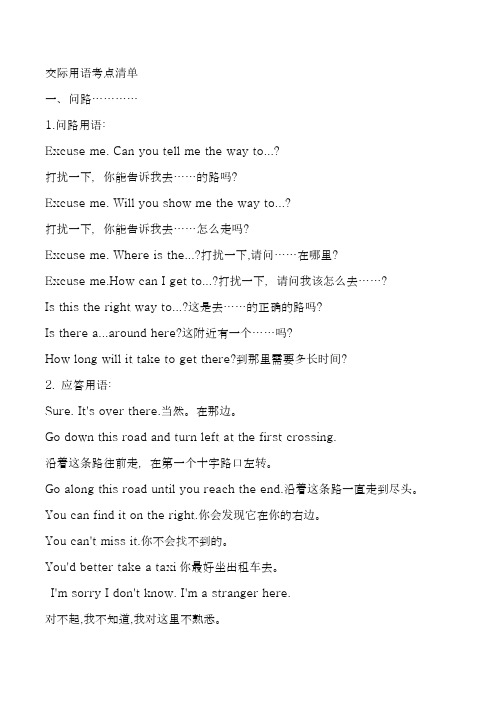
交际用语考点清单一、问路…………1.问路用语:Excuse me. Can you tell me the way to...?打扰一下,你能告诉我去……的路吗?Excuse me. Will you show me the way to...?打扰一下,你能告诉我去……怎么走吗?Excuse me. Where is the...?打扰一下,请问……在哪里?Excuse me.How can I get to...?打扰一下,请问我该怎么去……?Is this the right way to...?这是去……的正确的路吗?Is there a...around here?这附近有一个……吗?How long will it take to get there?到那里需要多长时间?2. 应答用语:Sure. It's over there.当然。
在那边。
Go down this road and turn left at the first crossing.沿着这条路往前走,在第一个十字路口左转。
Go along this road until you reach the end.沿着这条路一直走到尽头。
You can find it on the right.你会发现它在你的右边。
You can't miss it.你不会找不到的。
You'd better take a taxi你最好坐出租车去。
I'm sorry I don't know. I'm a stranger here.对不起,我不知道,我对这里不熟悉。
二、购物…………3. 售货员用语:Can/May I help you?有什么需要帮忙的吗?What can I do for you?你想要点儿什么?How much/many do you want?你想要多少?What colour/size/kind do you like?你想要什么颜色/尺寸/款式的? What about this one?这个/件怎么样?Here is your change.给你的找零。
英语口语交际900句学习

三、Identifying Objects 辨别物品
31. What's this? 这是什么? 32. It's a pen. 是支笔。 33. Is this your handbag? 这是你的手提包吗? 34. No, it isn't. / Yes, it is. 不,它不是。/是的,它是。 35. Whose pen is this? 这是谁的笔? 36. It's Kate's. 是凯特的。 37. Is that a car? 那是一辆小汽车吗? 38. No, it isn't. It's a bus. 不,那是一辆公共汽车。 39. What do you call this in English? 这个用英语怎么说? 40. What is the color of your new book? 你的新书是什么颜色的? 41. How big is your house? 你的房子有多大? 42. How long is the street? 这条街有多长? 43. What's the name of the cat? 这猫叫什么名字? 44. Where's the company? 那个公司在哪儿? 45. Which is the right size? 哪个尺码是课堂用语
• 16. May I come in? 我能进来吗? 17. Come in, please. 请进。 18. Sit down, please. 请坐。 19. It's time for class. 上课时间到了。 20. Open your books and turn to page 20. 打开书,翻到第20页。 21. I'll call the roll before class. 课前我要点名。 22. Here! 到! 23. Has everybody got a sheet? 每个人都拿到材料了吗? 24. Any different opinion? 有不同意见吗? 25. Are you with me? 你们跟上我讲的了吗? 26. Have I made myself clear? 我讲明白了吗? 27. Could you say it again? 你能再说一遍吗? 28. Any questions? 有什么问题吗? 29. That's all for today. 今天就讲到这里。 30. Please turn in your paper before leaving. 请在离开前将论文 交上。
英语口语交际常用语,简单的英语口语对话

英语口语交际常用语,简单的英语口语对话1、it’sherfield.这是她的本行。
2、you’rewelcome.不客气。
3、anythingelse?还要别的吗?4、i’mfull.我饱了。
5、how’sitgoing?怎么样?6、iloveyou!我爱你!7、goodluck!祝好运!8、ijustmadeit!我做到了!9、howmuch?多少钱?10、i’llseetoit我会留意的。
11、forgetit!休想!(算了!)12、heismyage.他和我同岁。
13、metoo.我也是。
14、anydaywilldo.哪一天都行夕15、iagree。
我同意。
16、i’mlost.我迷路了。
17、hereyouare.给你。
18、notyet.还没。
19、it’suptoyou.由你决定。
20、shutup!闭嘴!21、canihelpyou?我能帮你吗?22、blessyou!祝福你!23、takeiteasy.别紧张。
24、havefun!玩得开心!25、areyoukidding?你在开玩笑吧!26、i’mhisfan。
我是他的影迷。
27、noway!不行!28、that’sneat.这很好。
29、excuseme,sir.先生,对不起。
30、i’llfixyouup.我会帮你打点的。
31、feelbetter?好点了吗?32、whynot?好呀!(为什么不呢?)33、mygod!天哪!34、i’minahurry!我在赶时间!35、isityours?这是你的吗?36、helpyourself.别客气。
37、tobecareful!一定要小心!38、notbad.还不错。
39、givemeahand!帮帮我!40、idecline!我拒绝!41、comeon.来吧(赶快)42、followme.跟我来。
43、afteryou.您先。
44、don’tworry.别担心。
45、i’monadiet.我在节食。
高三英语口试常用话题50例
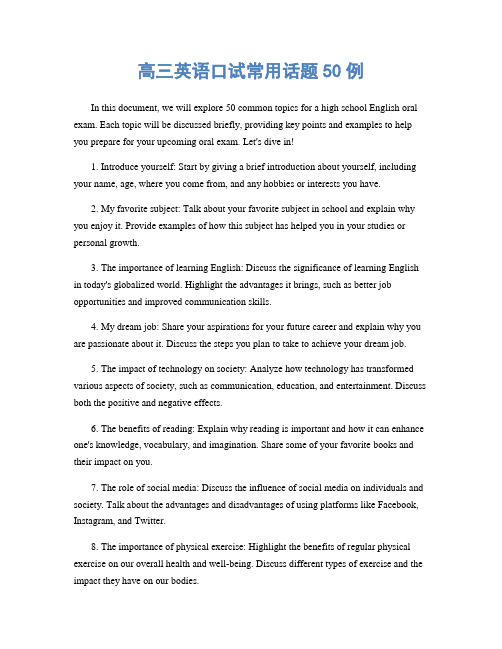
高三英语口试常用话题50例In this document, we will explore 50 common topics for a high school English oral exam. Each topic will be discussed briefly, providing key points and examples to help you prepare for your upcoming oral exam. Let's dive in!1. Introduce yourself: Start by giving a brief introduction about yourself, including your name, age, where you come from, and any hobbies or interests you have.2. My favorite subject: Talk about your favorite subject in school and explain why you enjoy it. Provide examples of how this subject has helped you in your studies or personal growth.3. The importance of learning English: Discuss the significance of learning English in today's globalized world. Highlight the advantages it brings, such as better job opportunities and improved communication skills.4. My dream job: Share your aspirations for your future career and explain why you are passionate about it. Discuss the steps you plan to take to achieve your dream job.5. The impact of technology on society: Analyze how technology has transformed various aspects of society, such as communication, education, and entertainment. Discuss both the positive and negative effects.6. The benefits of reading: Explain why reading is important and how it can enhance one's knowledge, vocabulary, and imagination. Share some of your favorite books and their impact on you.7. The role of social media: Discuss the influence of social media on individuals and society. Talk about the advantages and disadvantages of using platforms like Facebook, Instagram, and Twitter.8. The importance of physical exercise: Highlight the benefits of regular physical exercise on our overall health and well-being. Discuss different types of exercise and the impact they have on our bodies.9. My favorite movie: Describe your favorite movie and explain why it resonates with you. Discuss the plot, characters, and any life lessons you have learned from it.10. The impact of climate change: Discuss the consequences of climate change on the environment and human life. Talk about the importance of taking action to mitigate its effects.11. The benefits of volunteering: Explain why volunteering is important and how it can make a positive impact on both individuals and communities. Share your personal experiences with volunteering.12. The influence of celebrities on young people: Discuss how celebrities can influence the behavior and choices of young people. Analyze the positive and negative aspects of this influence.13. The importance of time management: Explain the significance of managing time effectively and how it can lead to increased productivity and reduced stress. Share some tips for effective time management.14. The impact of music on emotions: Discuss how music can evoke different emotions and moods. Share examples of songs or genres that have had a significant impact on you.15. The benefits of learning a second language: Explain the advantages of learning a second language, such as improved cognitive abilities and cultural understanding. Share your experience learning a second language.16. The role of parents in a child's education: Discuss the importance of parental involvement in a child's education and how it can positively influence their academic performance and personal development.17. The impact of social media on relationships: Analyze how social media has affected relationships, both positively and negatively. Discuss the challenges it poses and how to maintain healthy relationships in the digital age.18. The benefits of traveling: Explain how traveling can broaden one's horizons, expose them to different cultures, and provide valuable life experiences. Share your favorite travel destinations and the lessons you have learned from your journeys.19. The importance of financial literacy: Discuss the significance of understanding personal finance and how it can lead to financial stability and independence. Share some tips for managing money effectively.20. The impact of video games on young people: Analyze the effects of video games on young people's behavior, cognitive abilities, and social interactions. Discuss both the positive and negative aspects.21. The benefits of learning through online platforms: Discuss the advantages of online learning platforms, such as flexibility, accessibility, and a wide range of resources. Share your personal experience with online learning.22. The influence of advertising on consumer behavior: Analyze how advertising affects consumer choices and purchasing decisions. Discuss the strategies used by advertisers to influence consumers.23. The importance of mental health: Discuss the significance of mental health and how it affects overall well-being. Highlight the importance of seeking help and reducing the stigma surrounding mental health issues.24. The impact of globalization: Analyze how globalization has interconnected economies, cultures, and societies. Discuss the benefits and challenges it presents.25. The benefits of teamwork: Explain the advantages of working in a team and how it can enhance productivity, creativity, and problem-solving skills. Share your personal experiences working in a team.26. The influence of traditional media on society: Discuss the role of traditional media, such as newspapers and television, in shaping public opinion and disseminating information. Analyze the challenges they face in the digital age.27. The importance of cultural diversity: Explain the significance of embracing cultural diversity and how it enriches societies. Discuss the challenges and benefits of living in a diverse community.28. The impact of social pressure on teenagers: Analyze how social pressure can influence teenagers' behavior, decision-making, and self-esteem. Discuss strategies for coping with social pressure.29. The benefits of learning a musical instrument: Highlight the advantages of learning to play a musical instrument, such as improved cognitive abilities, discipline, and self-expression. Share your experience learning a musical instrument.30. The influence of role models on young people: Discuss how role models can inspire and influence young people's behavior and choices. Analyze the qualities of a positive role model.31. The importance of self-confidence: Explain the significance of self-confidence in achieving personal and professional goals. Discuss strategies for building self-confidence.32. The impact of fast food on health: Analyze the effects of consuming fast food on physical and mental health. Discuss the importance of a balanced diet and healthy eating habits.33. The benefits of learning through experiential activities: Explain how experiential activities, such as field trips and hands-on projects, enhance learning and retention. Share your personal experiences with experiential learning.34. The influence of peer pressure on teenagers: Discuss how peer pressure can affect teenagers' choices, behavior, and academic performance. Discuss strategies for resisting negative peer pressure.35. The importance of gender equality: Explain why gender equality is important and how it benefits individuals and society as a whole. Discuss the challenges and progress made towards achieving gender equality.36. The impact of social media on mental health: Analyze how excessive use of social media can affect mental health, including self-esteem, body image, and social interactions. Discuss strategies for maintaining a healthy balance.37. The benefits of learning a new skill: Highlight the advantages of learning a new skill, such as increased confidence, personal growth, and expanded opportunities. Share your experience learning a new skill.38. The influence of technology on education: Discuss how technology has transformed the education landscape, from online learning platforms to interactive teaching tools. Analyze the benefits and challenges of integrating technology in education.39. The importance of effective communication: Explain why effective communication is essential in personal relationships, professional settings, and everyday interactions. Discuss strategies for improving communication skills.40. The impact of social media on self-esteem: Analyze how social media can affect individuals' self-esteem, body image, and overall well-being. Discuss strategies for building positive self-esteem.41. The benefits of learning through multimedia resources: Discuss the advantages of using multimedia resources, such as videos and interactive websites, in learning. Share your personal experiences with multimedia learning.42. The influence of family on a child's development: Discuss how family dynamics, relationships, and values shape a child's personality, behavior, and future prospects. Analyze the role of parents and siblings in a child's development.43. The importance of critical thinking: Explain why critical thinking is crucial in problem-solving, decision-making, and analyzing information. Discuss strategies for developing critical thinking skills.44. The impact of social media on privacy: Analyze how social media platforms handle and protect user privacy. Discuss the risks and measures individuals can take to safeguard their privacy online.45. The benefits of learning through gamification: Highlight the advantages of using gamification in education, such as increased engagement, motivation, and retention. Share your personal experiences with gamified learning.46. The influence of music on culture: Discuss how music reflects and shapes culture, traditions, and social movements. Analyze the impact of different genres of music on society.47. The importance of lifelong learning: Explain why continuous learning is crucial for personal and professional growth. Discuss different ways to engage in lifelong learning.48. The impact of social media on democracy: Analyze how social media platforms have influenced political discourse, activism, and elections. Discuss the challenges and ethical considerations surrounding social media and democracy.49. The benefits of learning through peer collaboration: Discuss the advantages of collaborative learning, such as improved communication skills, critical thinking, and creativity. Share your personal experiences with peer collaboration.50. The influence of technology on creativity: Discuss how technology has impacted creativity, from digital art to music production. Analyze the advantages and challenges of using technology in creative pursuits.In conclusion, these 50 common topics for a high school English oral exam cover a wide range of subjects, allowing students to express their thoughts and opinions on various issues. By preparing for these topics, students can enhance their communication skills, critical thinking abilities, and overall confidence in oral presentations. Good luck with your oral exam!。
2023届高考英语口语表达汇总清单(共210句)
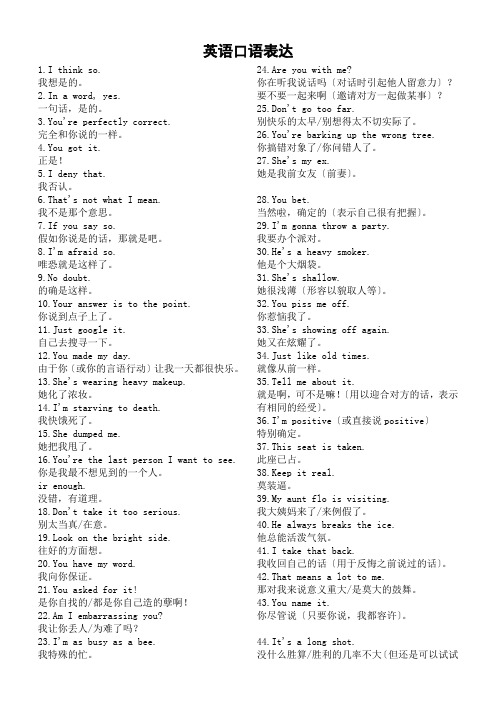
英语口语表达1.I think so.我想是的。
2.In a word, yes.一句话,是的。
3.You're perfectly correct.完全和你说的一样。
4.You got it.正是!5.I deny that.我否认。
6.That's not what I mean.我不是那个意思。
7.If you say so.假如你说是的话,那就是吧。
8.I'm afraid so.唯恐就是这样了。
9.No doubt.的确是这样。
10.Your answer is to the point.你说到点子上了。
11.Just google it.自己去搜寻一下。
12.You made my day.由于你〔或你的言语行动〕让我一天都很快乐。
13.She's wearing heavy makeup.她化了浓妆。
14.I'm starving to death.我快饿死了。
15.She dumped me.她把我甩了。
16.You're the last person I want to see. 你是我最不想见到的一个人。
ir enough.没错,有道理。
18.Don't take it too serious.别太当真/在意。
19.Look on the bright side.往好的方面想。
20.You have my word.我向你保证。
21.You asked for it!是你自找的/都是你自己造的孽啊!22.Am I embarrassing you?我让你丢人/为难了吗?23.I'm as busy as a bee.我特殊的忙。
24.Are you with me?你在听我说话吗〔对话时引起他人留意力〕?要不要一起来啊〔邀请对方一起做某事〕?25.Don't go too far.别快乐的太早/别想得太不切实际了。
高考英语情景交际用法总结附练习(完整)

高中英语情景交际总结及练习1.回答对方感谢(Thanks)—Thank you!—It’s a pleasure./My pleasure./Don’t mention it./That’s all right./You are welcome. 2.回答对方道歉(Apologies)—Sorry.—Never mind./It doesn’t matter./It’s all right./Forget it./That’s all right.3.回答对方请求—Can I.../Could I.../Would you mind if I...—1)Yes, please./Sure./Certainly./Of course./Please do./Of course, you can./Go ahead, please.—2)I am sorry; it’s not allowed./I’m afraid not./You’d better not./I’d rather you didn’t.4.回答对方提供帮助—Would you like me to help...—1)Yes, please./That’s very kind of you./Thank you. That would be nice./Thank you for your help.—2)No, thanks./Thank you all the same./It’s very kind of you, but I can manage it myself.5.表示同意和不同意—1)Sure./certainly./Exactly./Absolutely./That’s correct./Of course./All right.(好的)/I agree./I can’t agree more./That’s a good idea./Yes, I think so./ That’s exactly what I was thinking./That’s just how I see it.—2)No way./Of course not./I’m afraid I don’t agree./I don’t think so./Well, it depends./Well, I am not sure about it.6.几个常见的短语:1.So do I. “So+助动词+主语”表述前面一种表肯定意义的情况也适合后面的另一个人,意为“某人也一样”。
近10年高考英语天津卷交际用语总结

天津卷交际用语总结1. After you 您先请2.Hang on 稍等,别挂断3. With pleasure乐意效劳(回答别人请求帮助)4. My pleasure我的荣幸(回答感谢)5. Go ahead 去吧,用吧等(表示允许某人继续做某事)6. Sure thing当然,没问题7. Help yourself请自便8. Forget it算了吧(用语道歉的语境);休想(表示不接受对方观点或意见)9. That depends/it all depends视情况而定10. I don't mind at all我一点也不介意11. I couldn't agree more我再同意不过了12. You will make it你会成功的13. You can't be serious你不会是认真的吧14. It's a pity太可惜了15. I can hardly thank you enough我怎么感谢你都不为过16. I have no idea/have no idea我不知道17. Don't jump to conclusions不要轻易得出结论18. Don't mention it不客气19. There is no doubt about it毫无疑问20.What a mess一团糟21. It's settled就这么定了22. Take your time别着急,慢慢来(时间上不要着急)23. Take it easy别着急,放轻松(心理上安慰对方别着急)24. That's the point那就对了,正是问题的关键25. Tell me a bit more.再多告诉我一些26. I'm not so sure about that.我对此不确定27. Look on the bright side!看看积极的一面28. That's absolute nonsense!完全是胡说八道29.That's fine没关系;那好吧(表示无奈)30.No way 没门31. Of course 当然32. Hard to say很难说33. Not quite 不完全是34. Not exactly 不完全是35. That's for sure 当然36. Easy come easy go来得容易去的也快37. Far from it远非如此38. By all means当然39. So far so good 到目前为止一切还好40.What a pity 多可惜41. What a relief总算松了一口气/终于解脱了42. I've got it我明白了43. I didn't get it我不明白44. I've missed the point我没抓住重点45. That's it 就是这样了,好了(表示不必再做什么或者目的已经达到)46. Give it a try/have a try尝试一下47. You are kidding me.你一定是在开玩笑吧48. No wonder 难怪,不足为奇49. Good point好主意50. Never mind 没有关系51. Don't bother别麻烦了52. Good for him他真棒,他真了不起53. Go for it努力争取54. What a coincidence多巧55. All the best一切顺利,万事如意56. It's up to you取决于你57. You never know你永远不知道58. You read my mind你真了解我59. A piece of cake小菜一碟60. No problem 没问题61. Couldn't be better再好不过了62. Anything but that除了那件事别的都可以63. You bet 当然64. No kidding (用以强调陈述真实性)不开玩笑,说真的65. All right行;可以66. Don't worry别担心67. Enjoy yourself玩得开心68. Let's stick to the point让我们直奔主题69. It's nice of you你太好了70. It's really hard to say真的很难说71. It sounds like a great idea听起来是个好主意72. If you don't mind如果你不介意的话73.It's just between you and me这是你我之间的秘密74. So what?那又怎样?75.Why not ?为什么不呢?76.Who cares?谁在乎呢?77. How come?怎么会呢?78. Sounds like fun听起来很有趣(表示对某件事情感到兴奋或感兴趣)79. Just a minute等一会儿80. You are welcome不客气81. Better late than never迟做总比不做好82. The more the better越多越好83. So far so good到目前为止一切还好84. Too good to be true85. Sounds great.听起来好极了86. You must be kidding你一定在开玩笑。
北京高考英语口语考试

北京高考英语口语考试各位读友大家好,此文档由网络收集而来,欢迎您下载,谢谢北京高考英语口语英文口语1、Its all my fault.中文:都是我的错。
英文口语2、It isnt much.中文:这是微不足道的。
英文口语3、That couldnt be better.中文:那再好不过了。
英文口语4、I havent the slightest idea. 中文:我一点儿都不知道。
英文口语5、Hold your horses.中文:耐心点儿。
英文口语6、My phone was out of order.中文:我的电话坏了。
英文口语7、Im in a good mood.中文:我现在心情很好。
英文口语8、I suppose so.中文:我想是这样。
英文口语9、Could you take a picture for me? 中文:你能帮我拍照吗?英文口语10、Im good at it.中文:我做这个很在行。
英文口语11、Take my word for it.中文:相信我的话。
英文口语12、Its a nice day today.中文:今天天气很好。
英文口语13、Are you used to the food here? 中文:你习惯吃这儿的饭菜吗?英文口语14、Did you have a nice holiday? 中文:你假期过得愉快吗?英文口语15、Can I have a day off?中文:我能请一天假吗?英文口语16、I appreciate your invitation. 中文:感谢你的邀请。
英文口语17、Could you drop me off at the airport? 中文:你能载我到飞机场吗?英文口语18、Be my guest.中文:请便、别客气。
英文口语19、Im broke.中文:我身无分文。
中文:这事可能发生在任何人身上。
英文口语21、I wasnt born yesterday.中文:我又不是三岁小孩。
英语口语交际常用语及其翻译

英语口语交际常用语及其翻译在日常生活中,英语口语是我们与外国人沟通交流的重要工具。
掌握一些常用的口语表达,不仅能帮助我们更流利地与他人交流,也能增加自信心。
下面列举了一些英语口语交际常用语及其翻译,希望对大家的英语口语能力提升有所帮助。
打招呼与问候•Hello. 你好。
•Hi! 嗨!•How are you? 你好吗?•I’m fine, thank you. 我很好,谢谢。
•Nice to meet you. 很高兴见到你。
•Good morning! 早上好!•Good afternoon! 下午好!•Good evening! 晚上好!•How have you been? 最近怎么样?介绍自己与他人•My name is [name]. 我叫[name]。
•What’s your name? 你叫什么名字?•This is my friend, [name]. 这是我的朋友,[name]。
•Nice to meet you, [name]. 很高兴见到你,[name]。
•Where are you from? 你来自哪里?•I’m from [country/city]. 我来自[国家/城市]。
•What do you do for a living? 你做什么工作?•I’m a [occupation]. 我是一名[职业]。
礼貌用语•Please. 请。
•Thank you. 谢谢。
•You’re welcome. 不客气。
•Excuse me. 对不起/请问。
•I’m sorry. 我很抱歉。
•May I ask a question? 我可以问个问题吗?•Sure! 当然可以!日常交流•How can I help you? 我可以帮你什么忙?•Can you speak more slowly? 你能说慢一点吗?•I don’t understand. 我不明白。
•Could you repeat that, please? 你能再重复一遍吗?•What do you mean? 你是什么意思?•That’s a good idea. 那是个好主意。
高考英语情景交际常见用语(27张)

—Oh, I’m sorry. I’ll turn it down right now.
A. I ’d like to talk with youB. I’m really tired of this
C. I hate to say thisD. I need your help
•
分析: C。I hate to say this“我不想这么说”,表达委婉
的语气。
高考英语情景交际常见用语(共27张PP T)
高考英语情景交际常见用语(共27张PP T)
高考英语交际用语特殊答语
高考英语情景交际常见用语(共27张PP T)
高考英语情景交际常见用语(共27张PP T)
• I mean it我是认真的 • • A:Are you busy now? • 你现在忙吗? • B:Oh, not really. Why? • 哦,不怎么忙,有什么事?
• 英语中表达肯定与否定的常用语有: • 1. I’m (not)sure. • 2.I’m sure of that. • 3. There is no doubt that… • 4. It’s clear that... • 5. I’m not sure whether/if... • 6. It’s hard to say.
•
分析:B。对道歉的回应。Not to worry意为
“别担心;没关系”。
2.提供或请求帮助
• 英语中表提供或请求帮助的常见用语有: • 1. Would you do me a favour? • 2. May I ask a favour of you? • 3. What can I do for you? • 4. Could you help me with...? • 5. Can I/you give you/me a hand? • 6. Would you please help...?
高考英语常考交际用语汇总及练习

高考英语常考交际用语汇总及练习It’s a deal.说定了。
It’s up to you.由你来决定。
By all means. 当然。
By no means. 绝不。
Just so so. 一般般。
So far. 到目前为止。
Not quite. 不完全是。
What a coincidence! 多巧合啊!You can’t be serious!/ Are you kidding? 开玩笑吧?No kidding. 别开玩笑。
My pleasure. 我的荣幸(在回答别人感谢时说)。
With pleasure. 我乐意(在回答别人提出请求时回答。
)Not likely. 不大有可能。
Not really. 不完全是,不见得。
Is that so? 是真的吗?Not a bit. 一点也不。
Who cares? 谁在乎? Let’s go Dutch. AA制。
It’s a piece of cake. 小菜一碟。
So far so good. 目前为止,一切都好。
Got it. 懂了知道了。
It’s my treat. 我请客。
So what? 那又怎样?What’s up?怎么了?For what? 为什么?How come? 怎么会呢(惊讶)?Not a little. 很多。
You bet! 当然!I can’t help it/it can’t be helped. 实在没办法,无可避免。
It’s nothing/think nothing of it. 没什么(回答感谢)。
It couldn’t be better. 再好不过了。
No sense.不必。
Be my guest.请便,别客气。
That’s something.很了不起。
I’m with you on that.我赞同,我支持。
Do you really mean it?你是说真的吗?练习题1. —The Modern Art Exhibition in the City Museum has been canceled. —Oh, no! ______.A. It’s a pityB. It doesn’t matterC.I knew it alreadyD. It’s not interesting at all2. —I’m terribly sorry to interrupt, but may I use your phone? It’s rather urgent. — Yes, ________.A. with pleasureB. no hurryC. it doesn’t matterD. of course3. —Excuse me. How much is the shirt?— _______.A. Extra LargeB. 50 eachC. It sells wellD. Altogether there are 54. — How do you like a birthday party outdoors this weekend?—________.A. Very muchB. With pleasureC. Have funD. Good idea5.—Goodbye, John. Come back again sometime.—Sure. ______.A. I didB. I doC. I shallD. I will6. —I’m sorry for being late. I should have phoned you earlier.—_________. I’ve just arrived.A. That’s no troubleB. You are welcomeC. That’s all rightD. You can never tell7. — This film is very good. Do you think so, Jack?—________. I think the plot is too simple.A. To be honest, I think it's a fantastic filmB. But I don't like it at allC. It's my favorite filmD. I'm sorry to disagree8. —The trip shouldn’t take more than an hour.—_______. It is at least two hours.A. I guess soB. That’s itC. You must be jokingD. It depends9. —What shall we do tonight then?—_________—whatever you want.A.Help yourselfB. It’s a dealC. No problemD. It’s up to you10. —Which one of these do you want?—. Either will do.A.I don’t mindB. I’m sureB.No problem D. Go ahead11. —It really makes my blood boil when this sort of things happens.— ________.It's passed anyway.A. Take careB. That's a pityC. No problemD. Calm down12. —Mom, I'm going to the graduation dance tonight but I don't think I look attractive enough.—Oh, darling, don't worry. ________.A. They don't know what beauty isB. Nobody will care about itC. You look perfect the way you areD. Impossible is nothing13. —Sorry. I’m late. I got stuck in traffic.—_________. You’re here now. Come in and sit down.A. You are welcomeB. That’s rightC. I have no ideaD. Never mind14. —What are you going to do this weekend?一______ . If time permits, I may go to Shanghai with my friends.A. Don’t mention itB. It doesn’t matterC. Forget itD. It depends15. —May I turn down the radio a bit?—A. NoB. My pleasureC. All rightD. That’s right16. —I’m going to San Francisco for a couple of days.— ________. I wish I could get away for a while.A. It doesn’t matterB. Forget itC. I really envy youD. I can’t agree more17. — Is there anything else to discuss?—_____________. I guess.A.Not at allB. No, that’s allC. Yes, I’m sureD. Yea, of course18. —Try not to work yourself too hard. Take it easy.— Thanks. _________A. So what?B. No way.C. What for?D. You, too.19. —Honey, the cat stuck in the tree. Can you turn off the TV and get a ladder…?—Oh, it jumped off.__________ .A. Never mindB. All rightC. No problemD. Take care20. —Don’t worry, Mum. The doctor said it was only the flu.—_______! I’ll tell Dad there’s nothing serious.A.What a reliefB. CongratulationsC. How surprisingD. I’m so sorry21. —Mike, our team will play against the Rockets this weekend. I am sure we will win.—________!A. CongratulationsB. CheersC. Never mindD. Good luck22. —Do you mind my smoking here?—______.A. No, please don’tB. I don’t want you toC. I’m afraid I don’tD. I’d rather you didn’t23. — Can I help you, sir?—______.A. Yes, you canB. No, I don’t need any helpC. Of course, if you likeD. No, thanks, I’m being served24. —Have a sweet dream, Honey!—______.A. Thanks, anywayB. I willC. All rightD. You too25. —I'm not good at singing, you know.—________It's just for fun.A. Don't say so.B. Come on.C. What a pity!D. Cheer up.26. —How often do you visit your parents in the country?—I feel ashamed.________.A. Very oftenB. By accidentC. Just once in a whileD. All of a sudden27. —How do you find the match between Spain and Switzerland? —________Powerful Spain lost the game by 0:1.A. I watched it on TV.B. It's amazing!C. You guessed it!D. Congratulations!。
高考英语口语考试常用句子
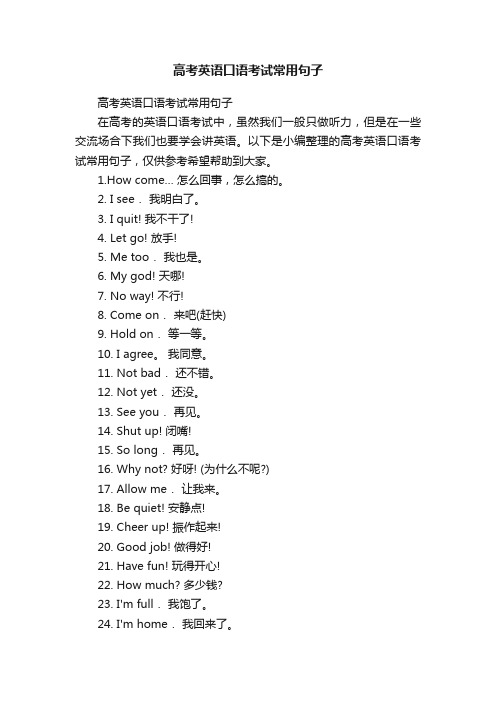
高考英语口语考试常用句子高考英语口语考试常用句子在高考的英语口语考试中,虽然我们一般只做听力,但是在一些交流场合下我们也要学会讲英语。
以下是小编整理的高考英语口语考试常用句子,仅供参考希望帮助到大家。
1.How come… 怎么回事,怎么搞的。
2. I see.我明白了。
3. I quit! 我不干了!4. Let go! 放手!5. Me too.我也是。
6. My god! 天哪!7. No way! 不行!8. Come on.来吧(赶快)9. Hold on.等一等。
10. I agree。
我同意。
11. Not bad.还不错。
12. Not yet.还没。
13. See you.再见。
14. Shut up! 闭嘴!15. So long.再见。
16. Why not? 好呀! (为什么不呢?)17. Allow me.让我来。
18. Be quiet! 安静点!19. Cheer up! 振作起来!20. Good job! 做得好!21. Have fun! 玩得开心!22. How much? 多少钱?23. I'm full.我饱了。
24. I'm home.我回来了。
25. I'm lost.我迷路了。
26. My treat.我请客。
27. So do I.我也一样。
28. This way。
这边请。
29. After you.您先。
30. Bless you! 祝福你!31. Follow me.跟我来。
32. Forget it! 休想! (算了!)33. Good luck! 祝好运!34. I decline! 我拒绝!35. I promise.我保证。
36. Of course! 当然了!37. Slow down! 慢点!38. Take care! 保重!39. They hurt. (伤口)疼。
40. Try again.再试试。
高中英语口语表达(完整版)

高中英语口语表达(完整版)本文旨在提供一份高中英语口语表达的完整版,以帮助学生们提高口语交流能力。
以下是一些常用的口语表达和对话情景,供参考:1. 问候与介绍- 问候:Hello! / Hi!- 自我介绍:My name is [Your Name]. I'm [Your Age] years old. Nice to meet you.2. 询问与回答- 询问名字:What's your name?- 回答名字:My name is [Name].- 询问年龄:How old are you?- 回答年龄:I'm [Age] years old.- 询问国籍:Where are you from?- 回答国籍:I'm from [Country].3. 日常活动- 询问问题:Can I ask you a question?- 回答问题:Sure! What's the question?- 邀请:Would you like to [Activity]?- 接受邀请:Yes, I would love to.- 拒绝邀请:Sorry, I can't. I have [Reason].- 提出建议:How about [Activity]?- 接受建议:That sounds like a great idea.- 拒绝建议:I'm not sure. Maybe next time.4. 学校生活- 询问上课时间:What time is your first class? - 回答上课时间:My first class starts at [Time]. - 询问课程内容:What subjects do you study? - 回答课程内容:I study [Subjects].5. 购物与餐饮- 询问去购物:Do you want to go shopping?- 回答去购物:Yes, I need to buy [Item].- 询问餐饮偏好:What kind of food do you like? - 回答餐饮偏好:I like [Cuisine].6. 旅行与观光- 询问旅行计划:Are you planning any trips?- 回答旅行计划:Yes, I'm planning to visit [Destination].- 询问观光景点:What are some famous sights to see?- 回答观光景点:Some famous sights to see are [Sights].以上只是一些常见的口语表达和对话情景,希望对学生们的英语口语练习有所帮助。
高考英语口语常见句型90句_英语口语考试常用万能句子
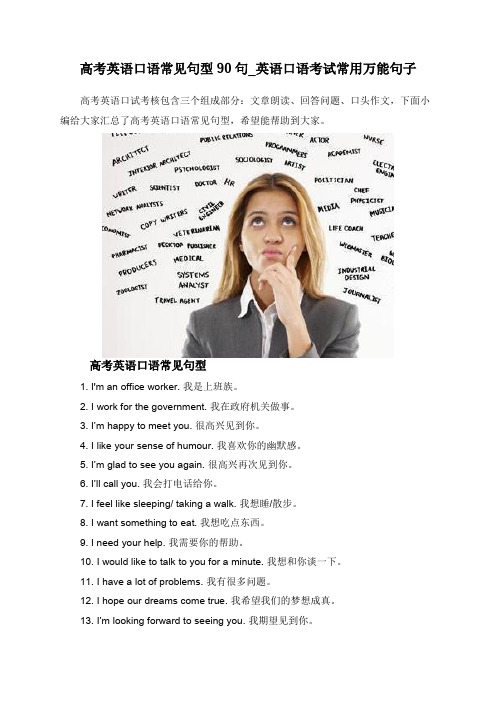
高考英语口语常见句型90句_英语口语考试常用万能句子高考英语口试考核包含三个组成部分:文章朗读、回答问题、口头作文,下面小编给大家汇总了高考英语口语常见句型,希望能帮助到大家。
高考英语口语常见句型1. I'm an office worker. 我是上班族。
2. I work for the government. 我在政府机关做事。
3. I’m happy to meet you. 很高兴见到你。
4. I like your sense of humour. 我喜欢你的幽默感。
5. I’m glad to see you again. 很高兴再次见到你。
6. I’ll call you. 我会打电话给你。
7. I feel like sleeping/ taking a walk. 我想睡/散步。
8. I want something to eat. 我想吃点东西。
9. I need your help. 我需要你的帮助。
10. I would like to talk to you for a minute. 我想和你谈一下。
11. I have a lot of problems. 我有很多问题。
12. I hope our dreams come true. 我希望我们的梦想成真。
13. I’m looking forward to seeing you. 我期望见到你。
14. I’m supposed to go on a diet / get a raise. 我应该节食/涨工资。
15. I heard that you’re getting married. Congratulations.听说你要结婚了,恭喜!16. I see what your mean. 我了解你的意思。
17. I can’t do this. 我不能这么做。
18. Let me explain why I was late. 让我解释迟到的理由。
- 1、下载文档前请自行甄别文档内容的完整性,平台不提供额外的编辑、内容补充、找答案等附加服务。
- 2、"仅部分预览"的文档,不可在线预览部分如存在完整性等问题,可反馈申请退款(可完整预览的文档不适用该条件!)。
- 3、如文档侵犯您的权益,请联系客服反馈,我们会尽快为您处理(人工客服工作时间:9:00-18:30)。
5.Not at all.
• (1) 用来回答感谢,意为:不用谢;不客气。如: • A:Thanks for helping me. 谢谢你帮助我。 • B:Not at all. I enjoyed it. 别客气,很高兴能帮你。
• (2) 用来回答道歉,意为:没关系。如: • A:I’m sorry to keep you waiting. 对不起,让你
事啦。如: • A:Can I help you with it? 要我帮你做这事
吗? • B:Never mind. 别费心啦。
(3) 用来回答道歉,意为:没关系;没什么。如: A:I’m sorry I’ve spilt some tea on the tablecloth. 对不起,我把茶洒在桌布上了。 B:Never mind, it will wash out. 没关系,洗得 掉的。 (4) 用来否定某一想法或提议等,意为:算了;没 什么。如: A:Do you still want to go to see him? 你还想 去看他吗? B:Never mind. 算了,不去了。
吗? • B:By no means. 绝不可以。
17. Never mind.
• (1) 表示安慰,意为:别着急;不要紧;没关系。 如:
• A:We’ve missed the train! 我们错过火车了。 • B:Never mind, there’ll be another in ten
minutes. 不要紧,过十分钟又有一趟。 • (2) 用来谢绝别人的提供,意为:不用啦;别费
• A:Are you going to the dance this Saturday? 这周星期六你去跳舞吗?
• B:It all depends. Are you going yourself? 到时候看情况而定,你去吗?
10.Not exactly. Not really
• (1) 表示轻微的否定,意为:不很……。如: • We weren’t exactly driving fast. 我们当时车开得不很快。
7.You’ll catch it.
• 表示:你会挨骂的;你会挨揍的。如:
• If the teacher sees you doing that, you’ll catch it. 要是老师发现你这样做,你会挨骂的。
e on.
• (1) 表示请求、鼓励、劝说等,意为:行啦。
• (2) 用来催促别人快走或快做,意为:快点。
• B:I couldn’t agree more. 你说得很对。
4. Go ahead.
• 表示同意或允许,意为:说吧;做吧;开始吧; 进行吧。如:
• A:Can I have the sports section? 我可以看体育 版吗?
• B:Yeah, go ahead, I’ve read it. 可以,你看吧。 我已看过了。
么关系? 我们有的是钱。
• (2) 用于对别人的质问或责难反唇相讥,意为:那 有什么不行的? 那为什么不行? 那有什么了不起? 如:
(3) 用于生气地告诉对方某情况与他们没有关系,意 为:这与你有什么关系? 如: A:Your room looks a real mess, Jack. 杰克,你 的房间看起来真是一团糟。 B:So what? 这与你有什么关系?
提了;别放在心上。如: • A:What’s he got to do with it? 这跟他有什么关系? • B:All right, forget it. 好吧,别提了。
12.It's hard to say.
• 用于委婉地表示没有把握,意为:说不准; 这事很难说。如:
• A:Will you be coming next week? 你下 周会回来吗?
• B:By all means. 当然可以。 • (2) 表示请求或意愿,意为:一定要;千万要;务
必。如: • By all means I must visit my sick friend. 我一
定得去看看我生病的朋友。
16.B:当然不行;绝不 是;绝不可以。如: • A:Can I leave now? 现在我可以离开了
• B:It's hard to say. 说不定。
13.Not likely.
• 表示拒绝或否认,意为:不可能;才不呢! 如:
• A:Will you come to the theatre? 去看戏 吗?
• B:Not likely. 才不去呢!
14.I didn’t mean it.
• 表示不是故意的(尤其用于认错或道歉),意 为:我不是故意的;我不是有心的。如:
18.No problem.
• (1) 用来回答感谢(主要用于美国英语中),意为: 不用谢;别客气;没什么。如:
• A:Thank you very much. 非常感谢你。 • B:No problem. 没什么。 • (2) 用来回答道歉(主要用于美国英语中),意为:
没关系。如: • A:Excuse me for smoking here. 请原谅我在
• (2) 用作回答,表示:不完全是;不完全如此;不全对。 如:
• A:So you missed the meeting. 所以你就错过了这次会 议?
• B:Not exactly. I got there five minutes before it finished. 不完全是这样,我在散会前五分钟赶到了那儿。
11. Forget (about) it.
• (1) 用来回答感谢,意为:算不了什么;不用谢了。 • (2) 用来回答道歉,意为:没关系。如: • A:I’m sorry I broke your coffee cup. 对不起,我打
破了你的咖啡杯。 • B:Forget it. 没关系。 • (3) 表示不想提及或无关紧要,意为:忘了它吧;别
6. Believe it or not.
• 意为:信不信由你;不管你信不信;我说的 是真的。如:
• I asked my boss for a month’s holiday and, believe it or not, he agreed. 我向老板请一个 月的假,信不信由你,他同意了。
• 注:有时也说 Would you believe it? / Believe or believe not。
• Forgive me please. I didn’t mean it. 请原 谅,我不是有意的。
• 有时也说:I didn’t mean to. 如:
15. By all means.
• (1) 表示同意或许可,意为:可以;行;没问题。 如:
• A:May I borrow your dictionary? 我可以用你 的字典吗?
• (3) 表示责备或不耐烦等,意为:得啦;行啦;够啦。
• (4) 用于挑战或激怒对方,意为:来呀;好吧;试试 吧。
• (5) 用于体育竞赛等场合鼓励队员,意为:加油。
9.It (all) depends. / That (all) depends.
• 表示某事或某情况还没有决定,得看情况 而定,意为:这很难说,那要看情况。如:
这儿抽烟了。 • B:No problem. 没关系。 • (3) 用来表示同意或愉快地回答请求,意为:没问
题;小事一桩。
20.So what?
• (1) 表示不在乎或无所谓,意为:那有什么关系? 如:
• A:I’m afraid it’s too expensive. 恐怕太贵了。 • B:So what? We’ve plenty of money. 那有什
英语口语交际英语讲 解
主讲:康久云 班级:372 381
1.Got it
• “知道了,明白了” • A : Please buy me some fruits • B : Got it ! • 给我买些水果吧 • 恩,知道了。
2. I couldn’t agree less
表示完全不同意对方的观点或看法等,可 译为:我一点也不同意;我完全不同意; 我绝对不同意。如:
久等了。 • B:Oh,not at all. I’ve been here only a few
minutes. 哦,没关系,我也刚到几分钟。
•
(3)用来表示否定(是No的加强说法),意为: 一点也不;完全不。如: A:Do you mind if I stay a little longer? 我 再呆一会儿你介意吗? B:No, not at all. 一点不介意。
• A:Perhaps we can sell the house. 也许 我们可以把房子卖掉。
• B:I couldn’t agree less. 我绝对不同意。
3.I couldn’t agree more.
• 译为:我完全同意;我举双后赞成;你说 得很对。如:
• A:I think it’s a bad idea. 我想这不是个好 主意。
